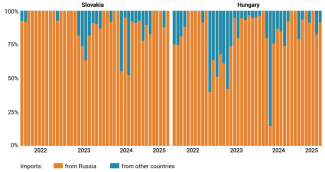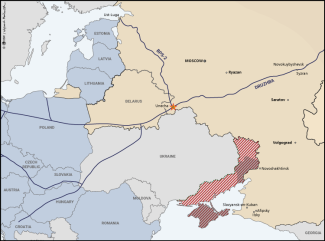Pressure on Russia, pressure on Hungary: Ukrainian strikes on the Druzhba oil pipeline
On 22 August, Ukrainian drones struck the Unecha distribution station in Bryansk Oblast for the third time in a month, halting the flow of Russian oil via the Druzhba pipeline to Hungary and Slovakia. That same day, Budapest and Bratislava sent a letter to the European Commission requesting support in ensuring supply security, describing Kyiv’s actions as ‘completely unacceptable’. Prime Minister Viktor Orbán also lodged a complaint with President Donald Trump, while Hungarian Foreign Minister Péter Szijjártó stressed that Ukraine is energy-dependent on Hungary: in 2024, Hungary accounted for 40% of Ukrainian electricity imports. Similarly, Slovakia’s Foreign Minister Juraj Blanár argued that strikes on energy infrastructure ‘do not serve Kyiv’s interests’, pointing out that Bratislava’s refinery processes Russian oil to produce diesel that covers 10% of Ukraine’s demand for the fuel.
On 24 August, President Volodymyr Zelensky stated that Kyiv had always maintained friendship with Budapest and that the Druzhba pipeline’s future now depended on Hungary’s position. The route accounts for 6% of Russia’s total crude exports to so-called ‘far abroad’ markets and also supplies Belarusian refineries and the Ust-Luga terminal.
Supply disruptions lasting only a few days do not pose a serious threat to the energy security of Hungary or Slovakia. By targeting the pipeline, Ukraine seeks to pressure Hungary to cease obstructing Ukraine’s European integration while also inflicting damage on Russia’s oil sector. Budapest, however, is unlikely to alter its stance – Fidesz is shaping its campaign for the 2026 parliamentary elections around the narrative of the alleged threat posed by Ukraine’s potential EU membership.
Commentary
- Ukraine seeks to inflict maximum damage on Russia’s energy sector by creating a domestic oil shortage and curbing Russian crude exports. Strikes on the Druzhba pipeline and the possibility of cutting Hungary off from supplies are most likely intended to pressure Budapest to reverse its decision to block the EU Council from opening the first negotiating cluster with Ukraine (‘Cluster, open up! Ukraine’s opportunities and risks on the road to the EU’). Zelensky lobbied on this issue in the United States, seeking to persuade President Trump to press Orbán to change his stance. The American president raised the matter with the Hungarian prime minister after the Ukrainian leader’s most recent visit to Washington. Ukraine could, in theory, suspend pipeline deliveries through its territory. However, it has so far refrained from doing so, most likely out of concern that Budapest and Bratislava would take the issue to arbitration.
- Short-term disruptions in oil supplies do not pose a significant threat to the energy security of Hungary or Slovakia. While both countries meet most of their demand through the Druzhba pipeline, EU regulations require them to maintain reserves equivalent to 90 days of consumption, and individual companies also hold their own stocks (for instance, Slovnaft has reserves for 10 days).
- A retaliatory halt in electricity and gas supplies from Slovakia to Ukraine appears unlikely. Exports are profitable and continue to grow, with gas transmission showing a significant increase this year. At the same time, they provide Bratislava with leverage in discussions in Brussels over the details of the safeguards package promised by the European Commission, intended to offset potential negative consequences for Slovakia of the planned full ban on hydrocarbon imports from Russia. Moreover, Bratislava has limited capacity to influence the companies engaged in trade with Kyiv.
- Hungary will not halt electricity exports to Ukraine due to their profitability and will maintain its negative stance on Ukraine’s European integration. This issue has become a central theme in Orbán’s government narrative ahead of the April 2026 parliamentary elections, with Fidesz portraying Ukraine’s potential EU accession as the greatest threat to national interests.
- For the Kremlin, the continued operation of the Druzhba pipeline is important both politically and economically. Under EU sanctions, the pipeline remains the only channel for selling crude to the lucrative EU internal market. Maintaining these supplies not only generates revenue for Moscow but is also viewed as a tool for influencing the EU’s policy direction. Dependence on Russian resources – as illustrated by Hungary and Slovakia – weakens the Union’s cohesion in its approach to Russia, complicating, for example, the adoption of new sanctions against it.
Table. Druzhba pipeline deliveries from Russia to non-CIS countries in the first half of 2025

Source: author’s own estimates based on data from Argus.
Chart. Proportions of monthly crude oil imports by Slovakia and Hungary between January 2022 and June 2025

Source: Eurostat.
Map. Route of the Druzhba pipeline, including the targeted Unecha distribution station






